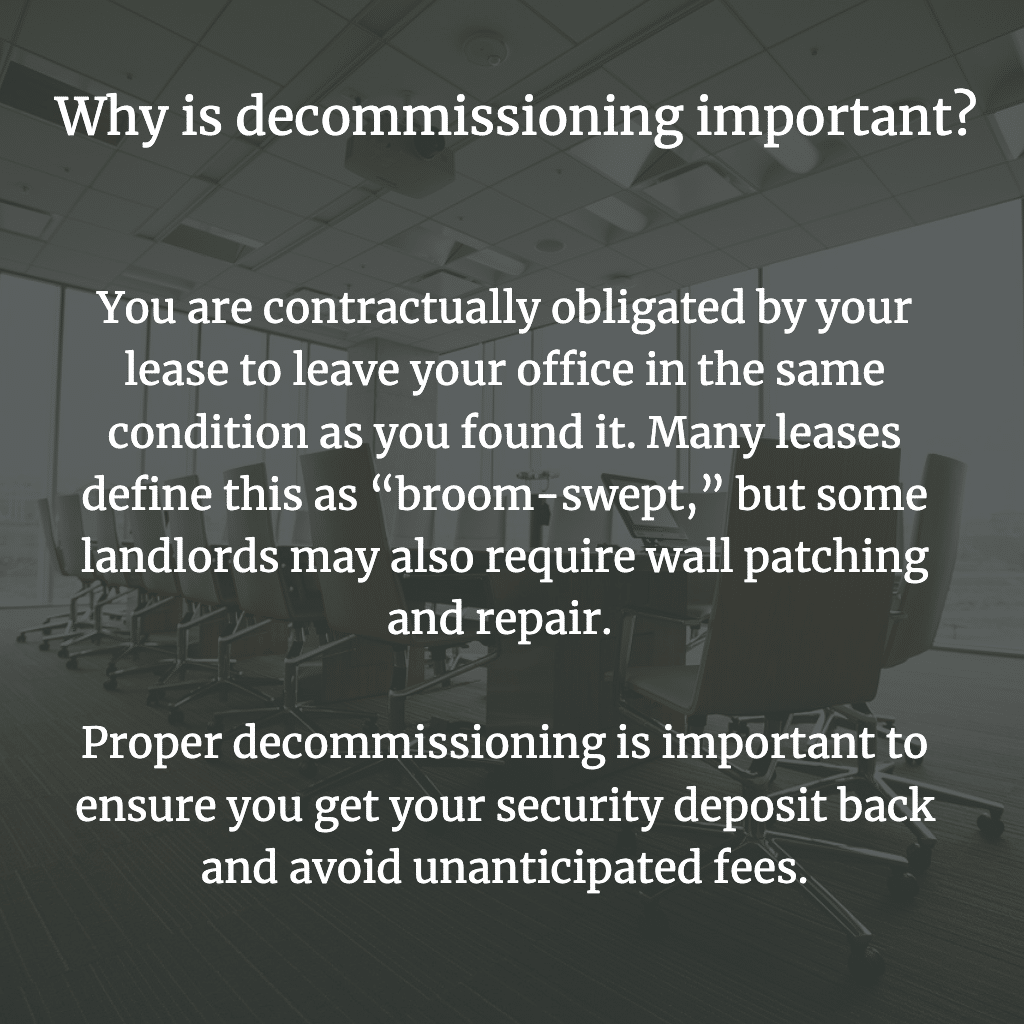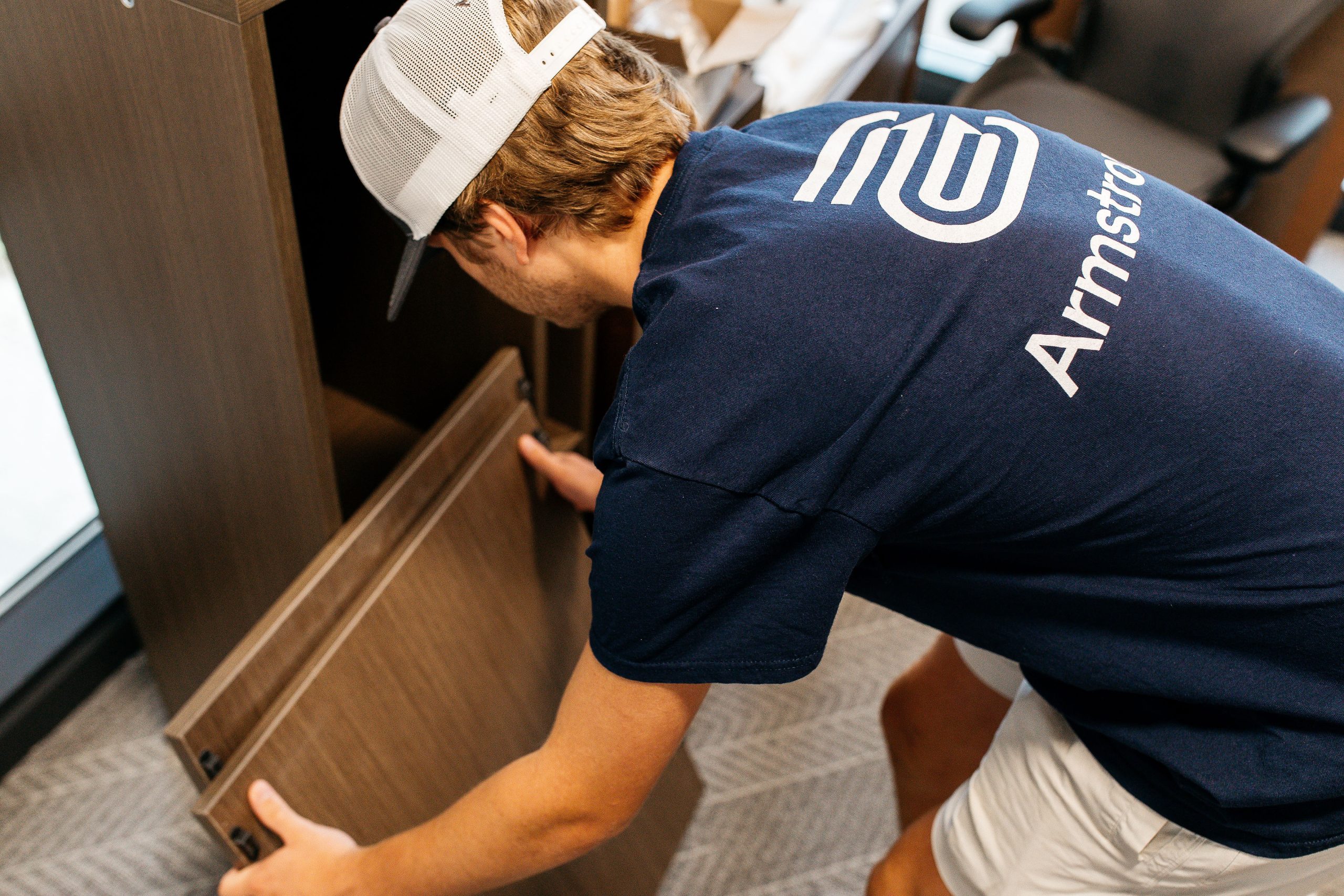Everything You Need to Know About Office Decommissioning

Companies nationwide are on the move.
A 2020 survey by Cisco Systems Inc. found that 53 percent of larger businesses planned to reduce the size of their offices and 75 percent were moving to more flexible work structures. As the future of the physical workspace remains in flux, decommissioning has become a stressor for companies in transition.
Before you settle into your new office, you will need to decommission your old one. For most lease agreements, this means that you must remove your belongings from the premises and perform any necessary repairs to leave your space in pristine condition.
Busy company managers often don’t have the time or expertise to handle this all in-house. Instead, you can entrust a relocation partner with your decommissioning needs.
If you’re preparing for a move, start thinking about the future of your current office early to avoid any last-minute snags in the decommissioning process. By planning ahead, you can save yourself time, money and stress, ensuring a smoother relocation experience. Familiarize yourself with the answers to these frequently asked questions to stay on top of your relocation.
Why is decommissioning important?

You are contractually obligated by your lease to leave your office in the same condition as you found it. Many leases define this as “broom-swept,” but some landlords may also require wall patching and repair. Proper decommissioning is important to ensure you get your security deposit back and avoid unanticipated fees.
A relocation partner can help you efficiently navigate the fine print of your lease so you can focus on settling into your new work environment. At Armstrong, a project manager develops a custom decommissioning plan to make sure you meet your lease requirements on time and on budget.
How do you decommission an office?
Start by researching relocation companies that offer high-quality decommissioning services. Look for a partner that has the assets, training and experience to handle every aspect of your move, from decommissioning your old office to setting up your new space.
Take inventory of your belongings and the measurements of your new workplace and communicate with your relocation partner about which items are coming with you. Your moving partner helps you dispose of everything else in an environmentally-friendly manner. Before you hand over the keys, you need to disassemble your furniture, unmount electronics from the wall, remove any signage and properly pack all your belongings. Your moving partner can provide all of these services for you.
How do you get rid of office furniture?
Before kicking your furniture to the curb, talk to your relocation partner about sustainable ways to rid your office of unwanted items. You can keep your furniture out of the dump by reselling, repurposing, refurbishing, recycling, donating or storing any pieces you no longer want. At Armstrong, we offer services to minimize disposal in the decommissioning process. With our help, you can make your relocation a little greener by reducing waste and earning cost-savings.
What should you do with your technology?
If you have an in-house Information Technology team, queue them up to handle the transfer of your equipment. Before your movers can load everything into the vans, your team needs to disconnect and pack your technology.
If you don’t have that kind of personnel, leave the technology deinstallations to the professionals at your relocation company. In addition to disconnecting, packing, moving and reconnecting your IT, your moving partner can also sustainably dispose of your e-waste including unwanted computers, monitors, copiers, fax machines and more.
How long does decommissioning take?
Depending on the size of your office, the relocation process from start to finish can take up to six months. Phased decommissioning in small steps will minimize disruptions for your employees and customers. Your relocation manager provides a detailed plan with dates and milestones to ensure your move stays on schedule.
Why is decommissioning so expensive?
Decommissioning doesn’t have to drain your budget, time and resources. A relocation partner with experience decommissioning large offices across the country knows how to make the process as cost-efficient as possible.
The right partner helps you keep costs low by reselling surplus furniture and assets or providing tax-benefit donation services. Your partner also reduces the risk of damage to your property with highly-trained crews, and they offer broom-sweep services to earn your security deposit back.
Why Armstrong?
Armstrong has been providing customer solutions since 1922. With 2.9 million square feet of warehouse space and 31 locations coast-to-coast, Armstrong can keep your costs low and your stress lower during this transition. Call Armstrong today at 800.288.7396 or request a free quote online.
